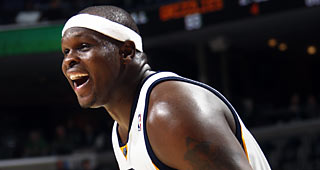The Oklahoma City Thunder and San Antonio Spurs have been the best two teams in the Western Conference all season long. The 44-16 Thunder have a +6.7 point differential; the 42-16 Spurs have a +5.6 point differential.
However, the regular season is a drastically different animal than the postseason, which is why a Western Conference Finals between the two is hardly guaranteed. It’s not because the game changes in April and May: the court is still 94 feet long, the rims are still ten feet high. Nor is it because either team has some type of character flaw that will be “exposed” on the NBA’s biggest stage.
What makes the playoffs different are your opponents. How a team performs against the other 29 teams can only tell us so much about how they will perform against the personnel of another excellent team in a seven-game series. The name of the game is matchups, which is why the Memphis Grizzlies and the Los Angeles Lakers should scare both of the favored teams out West.
Both teams have size and scoring ability in their frontcourt, with two players capable of running offense from the low-post. Memphis has the 7’1, 260 Marc Gasol and the 6’9, 265 Zach Randolph; Los Angeles has the 7’1 275 Andrew Bynum and the 7’0 250 Pau Gasol.
While low post scoring is the easiest way to generate offense in basketball, it’s just as valuable in terms of how you can dictate your opponent’s lineups. Small-ball lineups won’t work against Memphis or the Lakers, which makes a good portion of San Antonio and Oklahoma City’s regular season success meaningless.
The Spurs love to go small around Tim Duncan, but that won’t work against the Grizzlies or the Lakers. In 2011, a 61-win San Antonio team lost in the first round to a 46-win Memphis team because they were trying to defend Randolph with some combination of Matt Bonner and DeJuan Blair. Tiago Splitter has not been able to beat out either player in the Spurs rotation this season, and it’s unlikely Boris Diaw or Kawhi Leonard can make a difference on the low block.
There’s a reason San Antonio hasn’t won a second-round playoff game since 2008: their lack of size and shot-blocking, which they can get away with in the regular season, has been continually exposed. They have had a giant defensive hole for years, losing to Dirk Nowitzki in 2009, Amar'e Stoudemire in 2010 and Randolph in 2011.
No team is more matchup dependent than the Spurs, who were seriously trying to defend Bynum with the 6’7 Blair. When Bynum can shoot over and bully a defender as if he were a chair, it’s no surprise he grabbed 30 rebounds in one game.
The Thunder, who have a 6’10, 280 brick wall in Kendrick Perkins, won’t have the same matchup problems against the post scoring of the Grizzlies and Lakers. However, they’d much rather not play Perkins in the fourth quarter, as his lack of an offensive game really affects their floor spacing. When they can play Kevin Durant at the power forward position, they are practically indefensible.
But against Memphis and Los Angeles, Oklahoma City will have to keep Serge Ibaka and Perkins on the floor for most of the game. A lack of floor spacing doomed them against the Dallas Mavericks in the 2011 Western Conference Finals, as the Mavericks packed the lane and dared Thabo Sefolosha, Ibaka and Perkins to hit outside jumpers. Ibaka’s improving outside jumper makes that strategy far more dangerous, but he’s still far more effective offensively as a center than at power forward.
The Thunder have been rightly criticized for their stagnant offense in the fourth quarter, but it’s really hard to run creative offensive sets when both big men are uncomfortable with the ball in their hands. Their trio of stars on the perimeter should still be able to figure it out with Ibaka and Perkins in the paint, but their margin for error is a lot smaller.
That being said, there’s a reason why Memphis and Los Angeles aren’t the top two seeds in the West.
Randolph is coming back from a major knee injury; how he holds up is one of the great “known unknowns” of the playoffs. Oklahoma City defeated them in a tight second-round series last season by daring the Grizzlies to score from the perimeter. Memphis will have to count on the inconsistent Rudy Gay to be the difference in 2012.
The Lakers, meanwhile, don’t always take advantage of their massive size difference down low. They’ve been clicking offensively in Kobe Bryant’s absence, but they aren’t going to beat the Thunder if Kobe is shooting 25 times and Bynum is shooting 12.
Nevertheless, basketball games come down to exploiting matchup advantages, and the size of Memphis and Los Angeles gives them a fighting chance against the top two teams out West.

Jonathan Tjarks wrote on the NBA for RealGM from 2011-2016 before joining The Ringer.
Follow @JonathanTjarks on Twitter.


